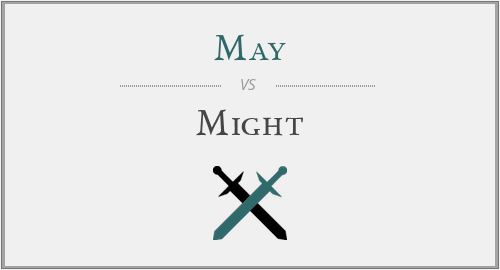
Most of us use “may” and “might” interchangeably. We often choose one or the other without giving it much thought and both sound right in most situations.
In this article, “May” vs “Might,” I will compare and contrast the two words, and I will show examples of when and how to use them correctly.
Use “May” in the Present and “Might” in the Past
Generally speaking, we use “may” when we are speaking about something that is happening in the present, using the present tense of the verb.
For example:
Using “May Have” in the Past Tense – Is it Interchangeable with “Might Have”?
“Might have” is the currently the acceptable form to use in the past.
For example:
• If I hadn’t gotten sick, I may have gone to the audition. (Unacceptable)
Use “May” and “Might” to Express Probability
Although the difference is slight, determining the probability of an occurrence can determine whether you choose to use “may” or “might.”
For example:
Is there a high probability that you will go for drinks after work? If so, then you would say, “I may go for drinks after work.” You mean, “It is likely that I will go for drinks after work.”
For example:
Is there a low probability that you will go for drinks after work? If so, then you would say, “I might go for drinks after work.” You mean, “It is unlikely that I will go for drinks after work.”
Use “Might” to Speculate
For example:
• If I save a bit each week, I might be able to buy that computer.
Use “May” and “Might” to Ask for Permission
For example:
• May I ask your name?
• Might I ask your name?
Although both words are correct, it is possible that the word “may” is used more often and sounds slightly more correct to our ear.
Final Thoughts:
Even after we have clarified the differences, we might find ourselves hesitating when choosing between “may,” “might,” “may not,” and “might not,” particularly when differentiating between asking for permission and expressing probability.
Consider the following sentence:
Does this mean that she is not allowed to invite her friends to the party or that she will probably not invite her friends to the party?
It can be confusing!
Although it is acceptable to use both "may not” and “might not” in cases of permission and probability, let's make it simpler by following two hard and fast rules:
Always use “May” and “May not” when asking for permission.
For example:
Always use “Might” and “Might not” when dealing with probability.
For example:
• “She might invite her friends to the party.” This means that there is a chance that she will invite her friends to the party.
• “She might not invite her friends to the party.” This means that she will probably not invite her friends to the party.
Summary and Guidelines
To ensure consistency, let’s make some guidelines:
• Always use “may” in the present tense (but not “may have”) and “might have” in the past tense.
• Always use “may” and “may not” when asking for permission (although both can be correct).
• Always use “might” and “might not” when dealing with probability (although both can be correct).
These guidelines “might” help you use the terms correctly.
However, you are invited and encouraged to make mistakes - you “may” err and falter often and with pride; language is meant to be practiced and mistakes are the natural way that a living, breathing language adapts and grows.




Have a discussion about this article with the community:
Report Comment
We're doing our best to make sure our content is useful, accurate and safe.
If by any chance you spot an inappropriate comment while navigating through our website please use this form to let us know, and we'll take care of it shortly.
Attachment
You need to be logged in to favorite.
Log In